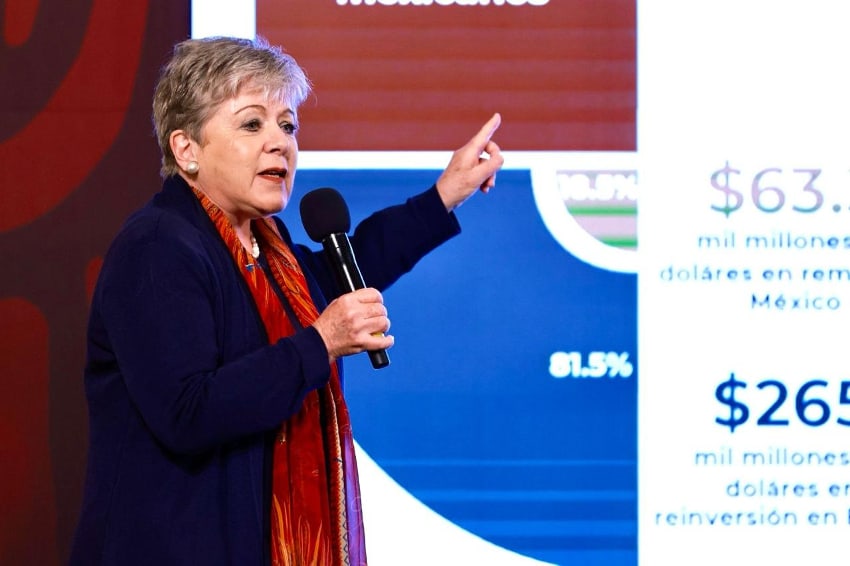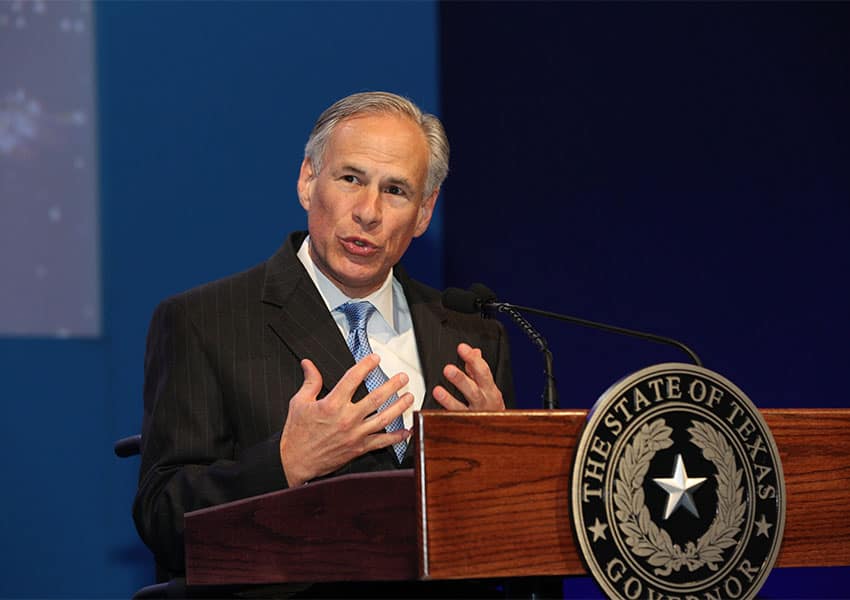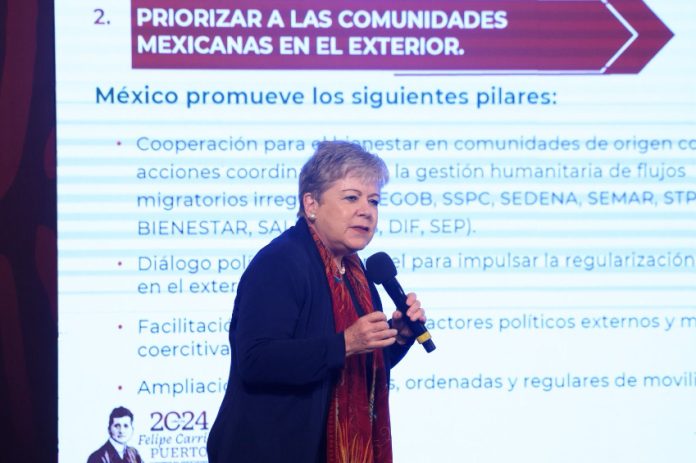Mexico is pushing for the regularization of millions of Mexicans in the United States, an objective that could become more difficult to achieve if Donald Trump returns to the White House next January.
Foreign Affairs Minister Alicia Bárcena noted on Monday that President Andrés Manuel López Obrador has lobbied U.S. President Joe Biden on the issue and said that she would travel to Washington, D.C. on Tuesday to continue the government’s advocacy work.

Speaking at López Obrador’s morning press conference, Bárcena said that Mexico is asking the United States to regularize the immigration status of Mexicans who have been living and working “honorably” in the U.S. for more than five years.
Among that cohort, she said, are around half a million so-called “dreamers,” Mexicans who benefited — at least for a period — from the Deferred Action for Childhood Arrivals, or DACA, immigration policy in the U.S.
“On the instruction of the president, I’m traveling to Washington tomorrow [Tuesday] to continue the negotiations to see whether we can really achieve regularization for our Mexicans,” said Bárcena, who could use the regularization issue as a bargaining chip in bilateral talks about what else Mexico can do to stem the flow of migrants to the northern border.
She noted that “the regularization of Mexicans [in the U.S.] is not unprecedented,” highlighting that “3 million Mexicans were regularized in 1986,” after then president Ronald Reagan signed the Immigration Reform and Control Act into law.

“What President López Obrador is asking for is a similar gesture,” Bárcena said.
She said there are 37.3 million Mexicans in the United States, explaining that 26.7 million of that number are second and third generation Mexicans while 10.6 million were born in Mexico.
Of the Mexico natives, 5.3 million are undocumented and they are “our central focus,” the foreign minister said.
Perhaps rehearsing part of the argument she will present to U.S. officials, Bárcena highlighted the contributions Mexicans make to the U.S. economy, and the country’s public coffers.

Mexicans pay US $324 billion in taxes per year in the United States and spend most of their earnings in the U.S., she said.
While Mexicans sent more than $63 billion home in remittances last year, United States-based Mexican workers spent “the rest of their income” — $265 billion or around 80% of what they earned — in the U.S., Bárcena said, emphasizing the value of that expenditure to the overall health of the U.S. economy.
The work Mexicans do in the U.S. is “invaluable,” she said, mentioning that those workers — including large numbers of undocumented ones — work in a range of sectors including agriculture, services and construction.
Seven of 10 agriculture workers in the United States are of “Mexican origin,” Bárcena said.
A well-known meme humorously highlights the crucial role that Mexicans (and other Latin American immigrants) play in food production in the United States, showing an image of a U.S. family thanking “Jesus” for their Thanksgiving meal on top of another image showing a farm worker (Jesús — note the accent) responding “De nada,” or you’re welcome.
“When they say that they’re going to return them all to us,” Bárcena said in reference to undocumented Mexican farmworkers, “who knows who will work in the fields in the United States.”

While she said “they,” she could have been referring to Trump, who declared on social media last month that “when I am President, on Day One, instead of fighting Texas, I will work hand in hand with Governor Abbott and other Border States to Stop the Invasion, Seal the Border, and Rapidly Begin the Largest Domestic Deportation Operation in History.”
“Those Biden has let in should not get comfortable because they will be going home,” added the former president, who will almost certainly be the Republican Party candidate at the U.S. presidential election on Nov. 5.
Immigration is set to be a central issue in the fight for the U.S. presidency, and both Biden and Trump will be looking to land an early blow on their opponent when they make visits to different sections of Texas’ border with Mexico later this week. The number of migrants crossing into the United States from Mexico has surged in recent times and border encounters (which includes apprehensions and expulsions) hit a new monthly high in December, according to U.S. government statistics. The majority (54%) of the encounters involved citizens from countries other than Mexico and the “Northern Triangle” (El Salvador, Guatemala and Honduras).
Whoever is inaugurated as U.S. president on Jan. 20, 2025 will have to deal with a new Mexican president as López Obrador’s (almost) six-year term will end in just over seven months.
Ruling party candidate Claudia Sheinbaum is currently the clear favorite to win the June 2 election, leading her main rival and opposition hopeful Xóchitl Gálvez by almost 24 points, according to the results of a recent poll. The new Mexican president will be sworn in on Oct. 1.
Mexico News Daily
